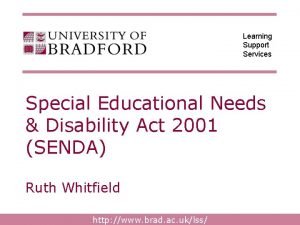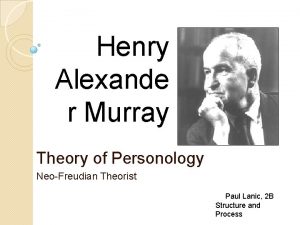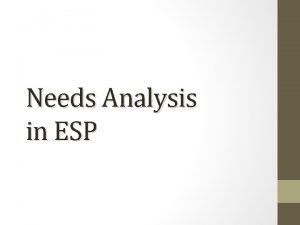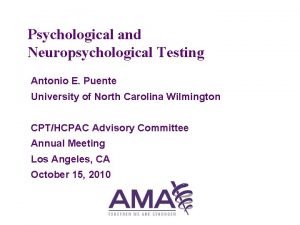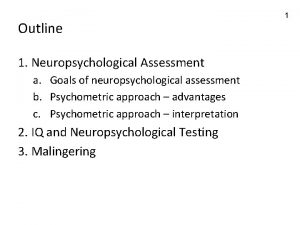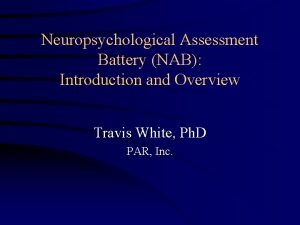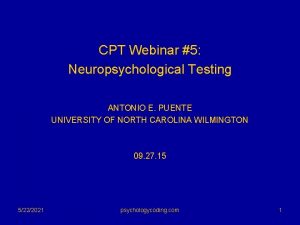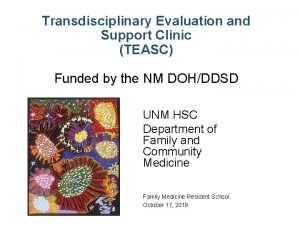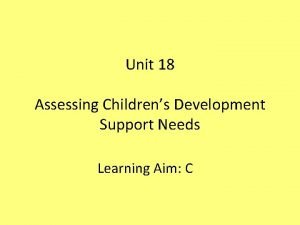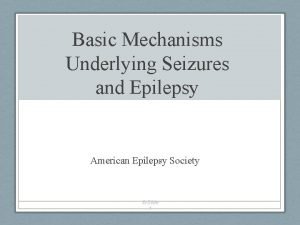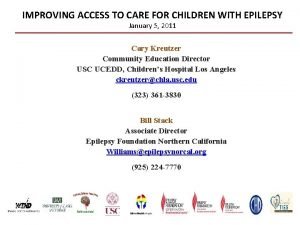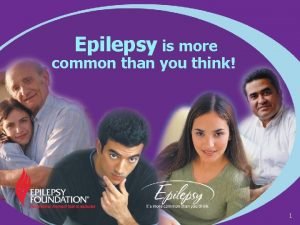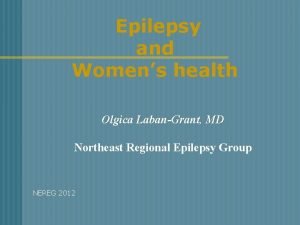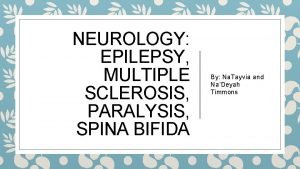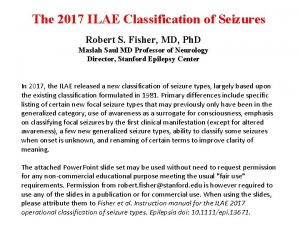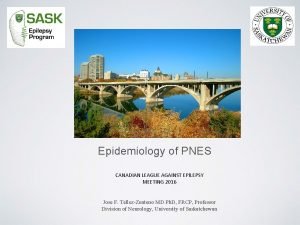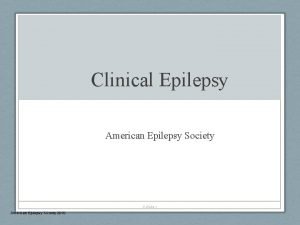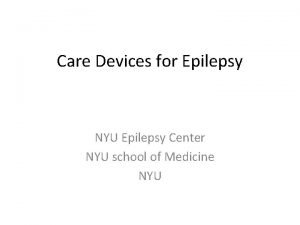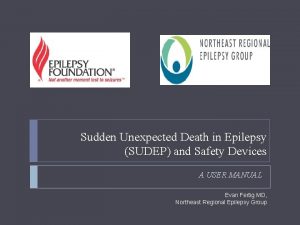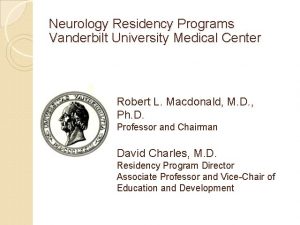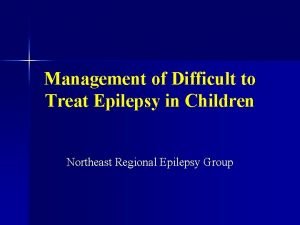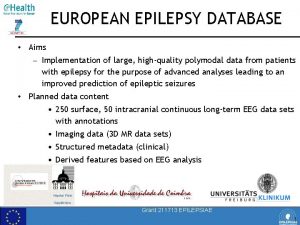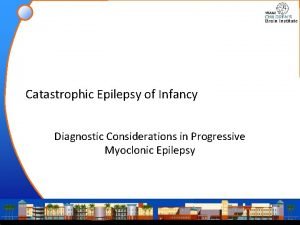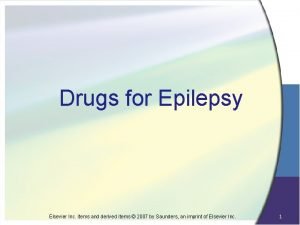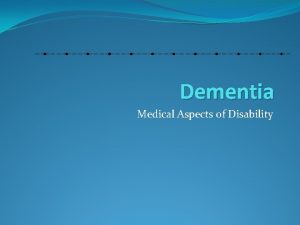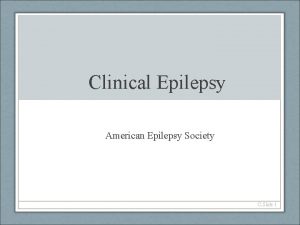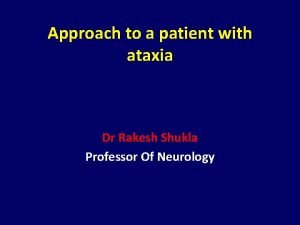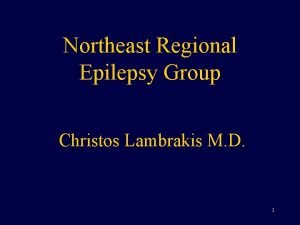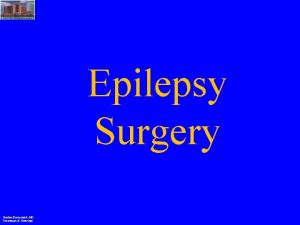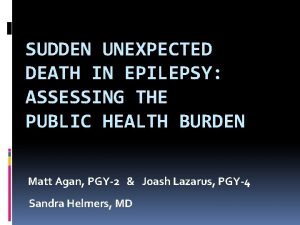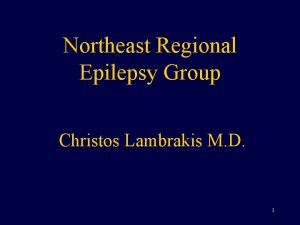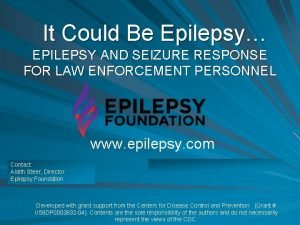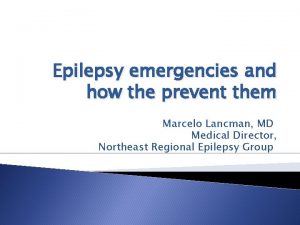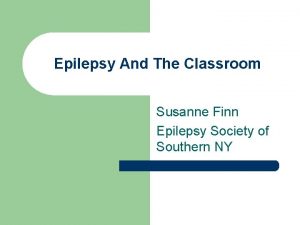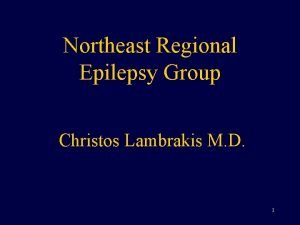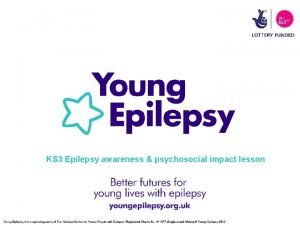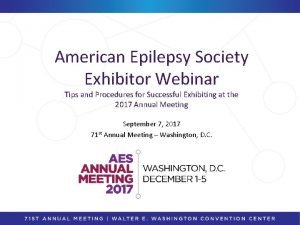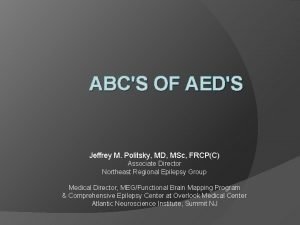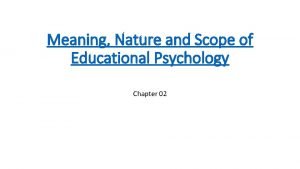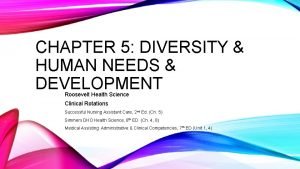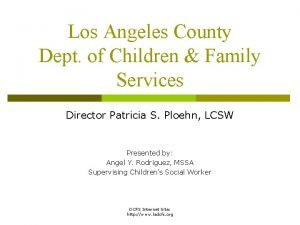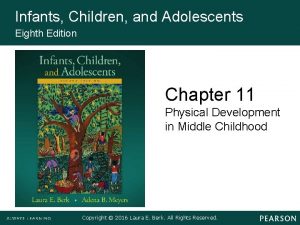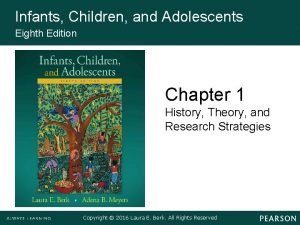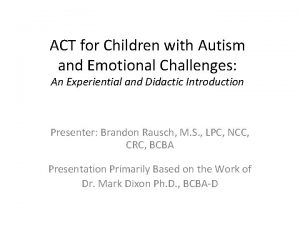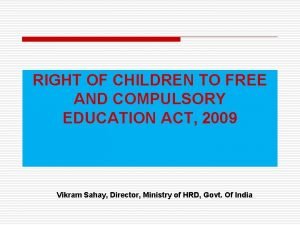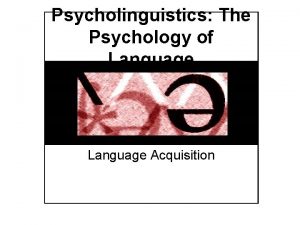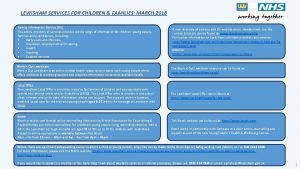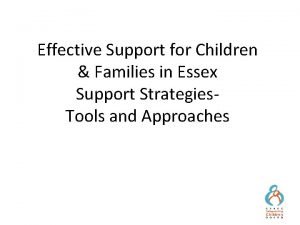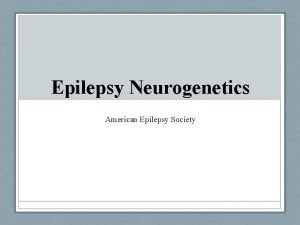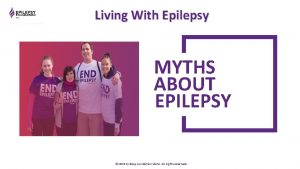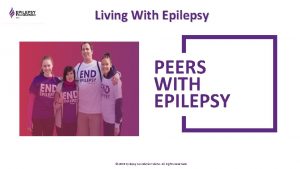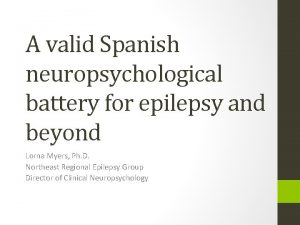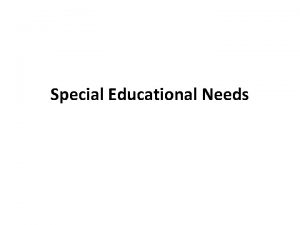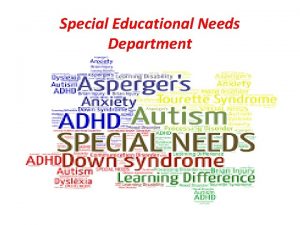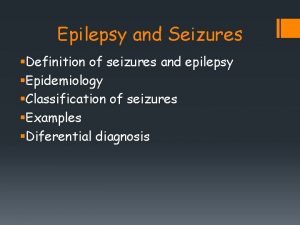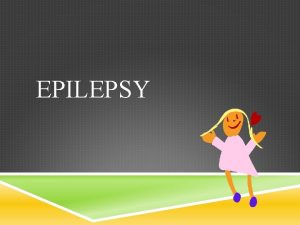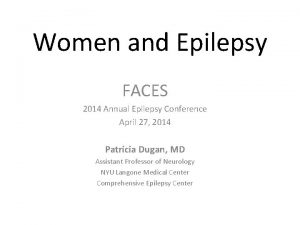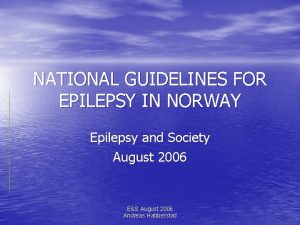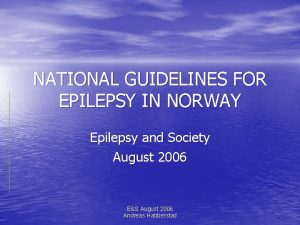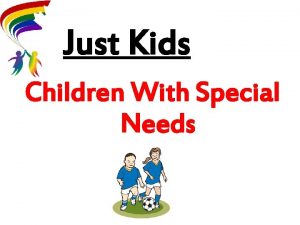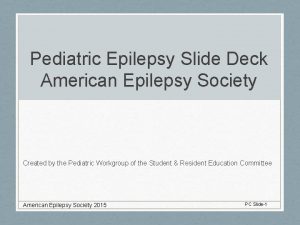NEUROPSYCHOLOGICAL AND EDUCATIONAL NEEDS OF CHILDREN WITH EPILEPSY




































































- Slides: 68

NEUROPSYCHOLOGICAL AND EDUCATIONAL NEEDS OF CHILDREN WITH EPILEPSY David H. Salsberg, Psy. D. Associate Director of Pediatric Psychology and Neuropsychology Rusk Institute of Rehabilitation, NYU Langone Medical Center May 6, 2012

Parents and Professionals • When to become concerned • What professionals do you consult with • What evaluations are available • How to prepare • What to do with the information • Interventions • Special Education or not Neuropsychological And Educational Needs Of Children With Epilepsy 2

Educational Implications for Children with Epilepsy • Etiology of Seizures underlying causes/conditions • Seizures frequency/control • Medications and effects • Age at Onset • Secondary effects missing school availability for learning emotional/family/psychological All can contribute to a variety of learning and attentional difficulties in children. Neuropsychological And Educational Needs Of Children With Epilepsy 3

When to take notice • Developmental lags noted • Discrepancy between skill area and “norm” or expected • Discrepancy between child’s own individual strengths and weaknesses • Signs/expressions of frustration; low self-esteem • Social skills difficulties • Mood/behavior changes • Academic and achievement difficulties Neuropsychological And Educational Needs Of Children With Epilepsy 4

Always need to take into consideration any medical/central causes such as hearing, vision, trunk/muscle weakness, genetic, neurological… Epilepsy- incidences of learning or attention issues range from 20 -70%, although unclear the incidence of those receiving interventions. Neuropsychological And Educational Needs Of Children With Epilepsy 5

Literature on Epilepsy • Wide range of presentation and comorbid diagnoses • Attention ADHD • Executive Functioning • Learning Differences Neuropsychological And Educational Needs Of Children With Epilepsy 6

How the Brain Works • The brain is like a computer that controls the whole body. • When something happens to the brain, any or all, or some of these areas can be affected to varying degrees. • Physical Abilities • Thinking/Learning • Speaking • Emotions • Personality • Behavior Neuropsychological And Educational Needs Of Children With Epilepsy 7

Goal of Neuropsychological Testing • To provide a complete picture of a child’s cognitive and emotional functioning across many domains related to brain function. • Concerned with learning and behavior in relation to a child’s brain • Should be functional in perspective with clear recommendations made for treatment and interventions Neuropsychological And Educational Needs Of Children With Epilepsy 8

Primary Evaluations §Psychological §History Intelligence Testing Behavioral Assessment Emotional/Personality §Psychoeducational §Psychological and Full Academic Achievement §All of the above and further exploration of areas of strengths and weaknesses §Neuropsychological And Educational Needs Of Children With Epilepsy 9

Testing Professionals §Psychologists School/Educational (Master’s, Doctorate) Clinical Ph. D. , Psy. D. §Neuropsychologists Neuropsychological And Educational Needs Of Children With Epilepsy 10

Other Disciplines/Team §Pediatrician/Developmental Pediatrician §Neurology §Nursing §Psychiatry §Physical Therapy §Speech and Language Therapy §Occupational Therapy §Special Educators All have specific scopes of practice Neuropsychological And Educational Needs Of Children With Epilepsy 11

District/School vs. Independent Evaluations Independent evaluation: §Parental control §Timing/flexibility of evaluation §Goal should be to evaluate the child holistically not just to get an evaluation done §Specific recommendations §No conflict of interest Needs to provide appropriate documentation and recommendations to be accepted and useful Be sure to understand timing/procedural issues Neuropsychological And Educational Needs Of Children With Epilepsy 12

Factors Impacting Testing §Why referred? §Motivation/Attitude §Rapport §Time Frame of testing §Disabilities §Seizure status/hospital/medications §Need to know what each test measures/doesn’t measure §Age §Culture/Language §Qualitative information necessary with scores Neuropsychological And Educational Needs Of Children With Epilepsy 13

Pediatric Specialization §Experience §Rapport §Knowledge of educational system §Limits of overly specialized, diagnosis focused evaluations, clinics Neuropsychological And Educational Needs Of Children With Epilepsy 14

Specific Issues in Epilepsy §All of the above §Experience with Epilepsy and range of learning, attentional and psychological issues §Timing and locations of evaluations §Reason for referral may dictate or limit evaluation (i. e. : presurgical evaluation) Neuropsychological And Educational Needs Of Children With Epilepsy 15

Discrepancy Based LD Evaluation §Discrepancy between IQ and achievement §Discrepancy between child and same age/grade peers §*Discrepancy between child’s own abilities and what should be expected What is clinically meaningful should translate to what is educationally and legally relevant Neuropsychological And Educational Needs Of Children With Epilepsy 16

Overall Cognitive Functioning Intelligence Testing - IQ §In neuropsychological and/or educational evaluation IQ test is used as starting point §Normative Comparison §Limitations of overall scores §Limitations of IQ as construct Neuropsychological And Educational Needs Of Children With Epilepsy 17

IQ Scores §IQ scores are often used as marker – need to make sure it is a good one! §Overall scores do not take into account variability in scores, especially Full-Scale IQ Neuropsychological And Educational Needs Of Children With Epilepsy 18

IQ Scores §In an effort to broaden the construct of IQ newer IQ measures incorporate numerous skills §Most notable – WISC-IV – can have high “traditional” IQ areas (Verbal, Performance) and have Full-Scale IQ lowered by Processing Speed and Working Memory §General Abilities Index – not always used but should be in many cases Neuropsychological And Educational Needs Of Children With Epilepsy 19

Picture Concepts Neuropsychological And Educational Needs Of Children With Epilepsy 20

Block Design Neuropsychological And Educational Needs Of Children With Epilepsy 21

Speech and Language §Neuropsychologists screen these areas in relation to full battery – gather from Speech-Language Evaluators §Speech/Oral-Motor not the same as Language §Need to gather audiological testing information §Look at expressive and receptive skills in a variety of contexts §Auditory Processing - CAPD §Adds valuable information to IQ scores §Augmentative Communication Neuropsychological And Educational Needs Of Children With Epilepsy 22

Visual-Motor/Visual-Perceptual §Parts of evaluations overlap w/ OT, especially in neuropsychological evaluation §Visual-Perceptual §Neglect / Inattention §Visual-Motor §Apraxia §Sensory Integration §Assistive Technology §Gross-Motor - PT Neuropsychological And Educational Needs Of Children With Epilepsy 23

Other Areas of Neuropsychological Evaluation §Attention and Concentration (In 1: 1 structured testing setting) §Memory visual; verbal; procedural; recall vs. recognition §Executive Functioning: Planning, organization, sequencing, working efficiently, flexibility, impulsivity Neuropsychological And Educational Needs Of Children With Epilepsy 24

Executive Functioning/Attention and Concentration Impulse control Distractibility Attention: Focused; selective; sustained/vigilance Auditory/Visual Not only attention – but organization, consolidation, etc… Planning, organization, time management Mental flexibility Neuropsychological And Educational Needs Of Children With Epilepsy 25

Memory Most common complaint – but influenced by attention/executive functioning skills Visual Verbal Procedural Recall vs. recognition Short-term vs. long-term Long-term – usually intact – but retrieval strategies may be impacted Neuropsychological And Educational Needs Of Children With Epilepsy 26

Academic Achievement Tests: • Limitation of brief screening of single-word reading, spelling and arithmetic in diagnosing learning problems. • Reading: decoding, sight words, comprehension, speed, fluency… • Passage Comprehension from WJ-III vs. WIAT-II Reading Comprehension • Teacher estimates are too subjective. • Importance of, but also limitations of Grade. Equivalents. • Standard Scores may be based on age or grade – very important. Neuropsychological And Educational Needs Of Children With Epilepsy 27

Psychological and Emotional Concerns • Depression • Anger • Anxiety • PTSD/ASD • Reality Testing • Defenses • Coping abilities/style • Motivation • Self-Esteem • Impulsivity • Disinhibition • Low Frustration Tolerance • Social Inappropriateness Emotional functioning needs to be given more concern before behavioral manifestation Neuropsychological And Educational Needs Of Children With Epilepsy 28

Family/Developmental issues • Independence/Dependence • Parents often more protective ‑ furthering these difficulties • Fantasy of all-protective parent/safe world potentially impacted Neuropsychological And Educational Needs Of Children With Epilepsy 29

Psychological Well being • Self-esteem • Social • Family system/issues • Educational opportunities and successes • Locus of Control • Not just a “diagnosis” • Adaptive functioning – physical/ADL’s but also social/emotional Neuropsychological And Educational Needs Of Children With Epilepsy 30

Physical/Medical Hospitalizations/Medications Neuropsychological Learning Cognitive Biopsychosocial Psychological Coping Developmental Family Issues Neuropsychological And Educational Needs Of Children With Epilepsy 31

Issues for Child • Physical/Medications • Confusion • Fear • Self-esteem • Missing school/activities • Social issues / teasing • Sibling issues Neuropsychological And Educational Needs Of Children With Epilepsy 32

Sibling’s Issues • Wanting more attention than they can always receive • Worrying when/if their sibling can get worse • Feeling helpless that there's nothing they can do to make things better • Anger • Fear • Separation anxiety Neuropsychological And Educational Needs Of Children With Epilepsy 33

Parenting Issues • Encouraging strength and resilience • Need to help convey sense of control – for aspects that the child can control • Being supportive, nurturing and available For affected child, as well as for non-affected siblings – and for yourself Neuropsychological And Educational Needs Of Children With Epilepsy 34

Factors affecting coping INTERNAL • Developmental Level/understanding • Personality • Prior coping mechanisms/strategies • Other interests/activities EXTERNAL • Family supports • Peer supports • An environment that promotes expression • Resulting life circumstances Neuropsychological And Educational Needs Of Children With Epilepsy 35

What can parents/families do? • Be open with your feelings • Allow for appropriate expression • Be honest • Seek help when needed • Balance between protection and overprotection • Let child know you also take care of yourself Neuropsychological And Educational Needs Of Children With Epilepsy 36

For Siblings • Give role / responsibility if and when appropriate and wanted • Make separate special times • Acknowledge before there is a problem – “squeaky wheel” • Allow / validate feelings even if they are negative or not nice • Set appropriate limits • Be careful of speaking in front of them always Neuropsychological And Educational Needs Of Children With Epilepsy 37

Reactions of friends and family • Feelings of helplessness • Confusion • Anger • Guilt • Fear • Sadness People often want to help, but may get conflicting messages from the person , feel helpless and confused and may not know what to do. Neuropsychological And Educational Needs Of Children With Epilepsy 38

What can one do to help? • Support: Be there for the child. Often, friends and family will feel a need to "problem solve" or fix the problem. However, physical presence and support are usually more valuable. • Education: Educate yourself by attending classes, reading books, or talking to a professional. • Communicate: Listen and allow the child to talk about their experience at his or her own pace. Do not minimize what the child is going through - even when well-intentioned • Share your feelings honestly and openly and reassure the child of your love and concern. Neuropsychological And Educational Needs Of Children With Epilepsy 39

• Do not focus solely on the medical: Follow the child’s lead on when to talk about it and when to take a break. Allow time for shared pleasant activities. • Broaden social support network: This support may come from other friends and family members, religious institutions, support groups, or trained mental health professionals. Neuropsychological And Educational Needs Of Children With Epilepsy 40

Symptoms of stress Will depend on child/developmental level… • Depression • Anxiety • Withdrawn • Anger/fighting • Mood/Behavior changes • Eating/Sleeping changes • Loss of interest in activities/motivation • Changes in academic functioning Neuropsychological And Educational Needs Of Children With Epilepsy 41

Appropriate emotional reactions vs. symptoms of concern • Degree of reaction • How symptoms/reactions manifest or do not • Duration • How impacts everyday functioning Neuropsychological And Educational Needs Of Children With Epilepsy 42

Overall Behavioral Strategies • Understanding/perspective/not personalizing • Respect - - back/forth • Give choices / control • Use reinforcements > punishment • Learn antecedents to problematic behavior • Prevent/set up situation to minimize problems • Need to figure out what they respond to/what has worked/hasn’t • As get to know issues – “outsmart them” Neuropsychological And Educational Needs Of Children With Epilepsy 43

Adaptive Functioning §Activities of Daily Living §Measures: Vineland-2 ABAS-II §Observation §Interviews §Needed for diagnosis of Mental Retardation Neuropsychological And Educational Needs Of Children With Epilepsy 44

Problems in Diagnosing LD §Discrepancy analysis §Qualitative/subtleties of difficulties §Structured 1: 1 setting §Difficulties do not always manifest themselves yet or on certain tests. Neuropsychological And Educational Needs Of Children With Epilepsy 45

Learning Disabilities • Specific Dyslexia, Dysgraphia, Dyscalculia • Non-Verbal Learning Disabilities • More General • Gaps in abilities/IQ and achievement • Developmental • Track over time/different demands Neuropsychological And Educational Needs Of Children With Epilepsy 46

Sensory Integration Organizing, integrating and interpreting sensory input in a variety of modalities including: touch, movement, body awareness, visual, and auditory information. • Developmental • Does it impact functioning? • Overlaps and/or interacts with other diagnoses conditions Neuropsychological And Educational Needs Of Children With Epilepsy 47

Auditory Processing §Difficulties in processing orally presented information even though hearing is within normal limits §Beware or “knee-jerk” label §Audiologist needs to diagnose §Age expectations §Interventions/recommendations §Overlap with other diagnoses Neuropsychological And Educational Needs Of Children With Epilepsy 48

PDD • Autism • Rett’s • Childhood Disintegrative Disorder • Asperger’s • PDD-NOS Wide variability in presentation Neuropsychological And Educational Needs Of Children With Epilepsy 49

ADHD/ADD • Hyperactivity • Impulsivity • Distractibility Issues to Consider • Developmental • Gender Bias • Overly diagnosed/overly simplified Neuropsychological And Educational Needs Of Children With Epilepsy 50

Treatment • Multi-disciplinary therapy • Community and (PT, OT, SP, School Support psychology). • Ongoing Assessment • Individual • Ongoing Psychotherapy Communication • Cognitive Remediation • Medication • Family Support • Group Support Neuropsychological And Educational Needs Of Children With Epilepsy 51

Recommendations §School placement §Therapies/Interventions §Compensatory techniques and strategies §Modifications in the Environment §Accommodations/Expectations §Assistive Technology §Medication/Treatments §Some sound good but may not help (e. g. tape recording lectures requires >2 x to listen and transcribe; laptop in class – only if great/fast typist…) Neuropsychological And Educational Needs Of Children With Epilepsy 52

Cognitive Rehabilitation • Strategies based on mass practice and repetition (exercising the brain) • In one study, many sessions of multicomponent cognitive therapy resulted in • limited change in overall intelligence • improvement in sustained attention • Some improvement in academic achievement Butler and Copeland 2002 Neuropsychological And Educational Needs Of Children With Epilepsy 53

Interventions • School placement • Accommodations • Therapies – should be data driven • OT • PT • Speech/Language • Psychotherapy • Nutrition/Homeopathy/Alternative approaches Neuropsychological And Educational Needs Of Children With Epilepsy 54

Individuals with Disabilities Education Improvement Act of 2004 (IDEA 2004) Purpose: To ensure that all children with disabilities have available to them a free appropriate public education that emphasizes special education and related services designed to meet their unique needs and prepare them for further education, employment, and independent living. 20 U. S. C. Sect. 1400(d) Neuropsychological And Educational Needs Of Children With Epilepsy 55

Individuals with Disabilities Education Act • All children with disabilities receive a free appropriate public education (FAPE) • A school district must provide special education and related services (PT, OT, Speech, Special Education, Counseling, Health paraprofessional) at no cost to the child or his/her parents. Only required to provide what’s appropriate – not optimal or best Neuropsychological And Educational Needs Of Children With Epilepsy 56

Parental Referral to Local Education Authority Write a letter to the Chairperson of your Committee on Special Education requesting an evaluation for possible special education needs. Federal and New York State law requires that Districts complete the evaluation process within 60 school (business) calendar days. All communication with your district should be in writing, and you must have proof of delivery of all communication. Your School District cannot refuse to evaluate your child upon your request. Neuropsychological And Educational Needs Of Children With Epilepsy 57

Evaluation Parents must consent to an initial evaluation. A variety of assessment tools and strategies must be utilized to gather relevant functional, developmental, and academic information about the child. This includes information provided by the parent. No single measure or assessment may be used as the sole criterion for determining whether a child is a child with a disability or to determine an appropriate educational program. Must be appropriate to be used with that child. Copies of results of all assessments performed must be provided to the parents, at no cost. Neuropsychological And Educational Needs Of Children With Epilepsy 58

Identification/Development of an IEP Determination of eligibility Classification Program Recommendation Present Levels of Academic Performance Goals/Objectives Related Services Neuropsychological And Educational Needs Of Children With Epilepsy 59

Classification Section 504 of the American with Disabilities Act requires recipients to provide to students with disabilities appropriate educational services designed to meet the individual needs of such students to the same extent as the needs of students without disabilities are met. A 504 Accommodation does not require an IEP, but simply provides for classroom modifications and/or related services Neuropsychological And Educational Needs Of Children With Epilepsy 60

Classification • Autism • Deafness • Deaf/Blindness • Emotional Disturbance • Hearing Impairment • Learning Disability • Mental Retardation • Multiple Disabilities • Orthopedic Impairment • Other Health Impairment • Speech or Language Impairment • Traumatic Brain Injury • Visual Impairment including Blindness *Can have very different implications for services and placement Neuropsychological And Educational Needs Of Children With Epilepsy 61

Issues in Educational Planning • Seizure plan • Nurse • Health paraprofessional • Medications and effects • Effects on learning Attention Fatigue • Stigma and Social Considerations • Dietary or activity restrictions • Emotional and family issues affect educational planning Neuropsychological And Educational Needs Of Children With Epilepsy 62

Placement This is performed at the CSE meeting, except in some districts (New York City), where this is done by the placement office. You do have the right to view any placement proposed for your child. Charge and goal is for the least restrictive environment (LRE) Neuropsychological And Educational Needs Of Children With Epilepsy 63

School Placement • Section 504 – Not CSE • Public School General Education with related services Therapies Resource Room / Special Education Teacher Support Services (SETSS) Paraprofessional • Inclusion /Co-teaching class • 12: 1: 1, 8, 6…. • NPS – approved schools • Carter Funding Neuropsychological And Educational Needs Of Children With Epilepsy 64

Dispute Resolution • Independent Educational Evaluation (IEE) Parent has the right to an IEE if they disagree with an evaluation obtained by the district Upon request by a parent for an IEE, a District must either file a due process complaint to show that its evaluation is appropriate or ensure than an IEE is provided at public expense • Mediation Voluntary; must be conducted by a qualified and impartial mediator; must be paid for by the District, who maintains a list of qualified mediators that are assigned on a rotational or random basis; It is binding • Impartial Hearing – Impartial Hearing Officer • Appeals – State level first Neuropsychological And Educational Needs Of Children With Epilepsy 65

Summary Need to incorporate all objective data, scores from testing, observations, outside therapists, history, emotional/personality variables, family, and school data in order to make well thought out decisions for children. And the Law Neuropsychological And Educational Needs Of Children With Epilepsy 66

Parents Know Best • Trust your instincts • Be involved / carry-over • Educate yourselves (pros and cons of internet) • Know your rights (Advocacy/Lawyers) Neuropsychological And Educational Needs Of Children With Epilepsy 67

Questions? Neuropsychological And Educational Needs Of Children With Epilepsy 68
 Special educational needs and disability act 2001
Special educational needs and disability act 2001 Primary needs and secondary needs
Primary needs and secondary needs Primary needs and secondary needs
Primary needs and secondary needs Alpha press murray
Alpha press murray Strategic gender needs and practical gender needs
Strategic gender needs and practical gender needs Target needs and learning needs
Target needs and learning needs Neuropsychological testing examples
Neuropsychological testing examples Boston naming test images
Boston naming test images Nab neuropsychological assessment battery
Nab neuropsychological assessment battery Cpt code 96118 neuropsychological testing
Cpt code 96118 neuropsychological testing Unm center for neuropsychological services
Unm center for neuropsychological services Unit 18 assessing children's development support needs p1
Unit 18 assessing children's development support needs p1 Friends of children with special needs
Friends of children with special needs Basic mechanisms underlying seizures and epilepsy
Basic mechanisms underlying seizures and epilepsy Difference between seizure and epilepsy
Difference between seizure and epilepsy Epilepsy and seizure services near walnut creek
Epilepsy and seizure services near walnut creek Difference between seizure and epilepsy
Difference between seizure and epilepsy Catamenial epilepsy and birth control pills
Catamenial epilepsy and birth control pills Spina bifida
Spina bifida Seizure types and symptoms
Seizure types and symptoms Canadian league against epilepsy
Canadian league against epilepsy Seizure vs syncope
Seizure vs syncope Nyu pediatric epilepsy
Nyu pediatric epilepsy Aremco epilepsy
Aremco epilepsy Williamson medical center pharmacy residency
Williamson medical center pharmacy residency Benign rolandic epilepsy rch
Benign rolandic epilepsy rch Epilepsy trigger
Epilepsy trigger European epilepsy database
European epilepsy database Catastrophic epilepsy infancy
Catastrophic epilepsy infancy Seizure headache
Seizure headache Aed medical abbreviation seizure
Aed medical abbreviation seizure Epilepsy foundation eau claire wi
Epilepsy foundation eau claire wi Epilepsy
Epilepsy Depakote epilepsy
Depakote epilepsy Reversible dementia
Reversible dementia Epilepsy
Epilepsy Spinocerebellar ataxia
Spinocerebellar ataxia Levenogestral
Levenogestral Northeast regional epilepsy group
Northeast regional epilepsy group Northeast regional epilepsy
Northeast regional epilepsy Epilepsy
Epilepsy Epilepsy death
Epilepsy death Benign rolandic epilepsy icd 10
Benign rolandic epilepsy icd 10 Ykp epilepsy
Ykp epilepsy Dr zawadzki
Dr zawadzki Ne regional epilepsy group
Ne regional epilepsy group What is a seizure
What is a seizure Aremco epilepsy
Aremco epilepsy Epilepsy society of southern ny
Epilepsy society of southern ny Northeast regional epilepsy
Northeast regional epilepsy Young epilepsy
Young epilepsy American epilepsy society annual meeting 2017
American epilepsy society annual meeting 2017 Diamox 250
Diamox 250 Briefly discuss nature and scope of education psychology
Briefly discuss nature and scope of education psychology Chapter 5 diversity and human needs and development
Chapter 5 diversity and human needs and development Stated and unstated needs travel and tourism
Stated and unstated needs travel and tourism Bloodline of adam and eve
Bloodline of adam and eve Children and family services los angeles
Children and family services los angeles Gains in perspective taking permit the transition to
Gains in perspective taking permit the transition to Berk 8th edition
Berk 8th edition And her children will call her blessed
And her children will call her blessed Self as context
Self as context Wechsler adult and children scales - fsiq - mean 100 sd 15
Wechsler adult and children scales - fsiq - mean 100 sd 15 Child centred curriculum
Child centred curriculum Overextension in psychology
Overextension in psychology Mother courage themes
Mother courage themes Downderry children's and family centre
Downderry children's and family centre Effective support for children and families in essex
Effective support for children and families in essex Telegraphic stage examples
Telegraphic stage examples
